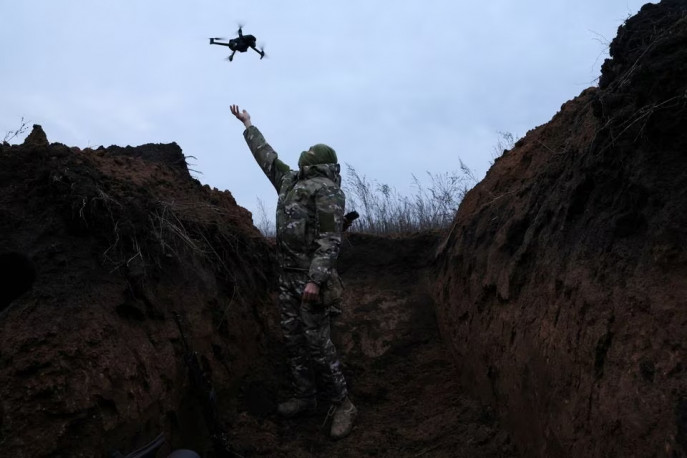Artificial intelligence (AI) has recently become a revolutionary force, particularly in the field of warfare. Humanity must balance the potential of AI with the need to exercise ethical and moral restraint to harness its benefits.
A soldier from the Ukrainian army’s 58th Independent Motorized Infantry Brigade grabs a drone as he tests its use nearby. The photo was taken near Bakhmut, Ukraine, on November 25, 2022. Photo: REUTERS
“>

A soldier from the Ukrainian army’s 58th Independent Motorized Infantry Brigade grabs a drone as he tests its use nearby. The photo was taken near Bakhmut, Ukraine, on November 25, 2022. Photo: REUTERS
“The tragedy of war is that it uses the best in man to do the worst.” —Henry Fosdick
Historically, war has played an important role in technological progress. The need for competitive advantage in conflict has often encouraged innovation, leading to the development of new and more powerful tools.
In recent times, the field of artificial intelligence (AI) has become a focal point for military applications, demonstrating how warfare can accelerate technological progress. However, it is also crucial to recognize that the influence of war on technology is not always benign. Technologies originally created to serve humanity have often been transformed into destructive tools.
For example, the development of nuclear technology promised unlimited potential for clean, efficient energy production, providing a glimmer of hope for global progress. However, with the bombings of Hiroshima and Nagasaki during World War II, the dual nature of nuclear power was clearly revealed.
This transformation demonstrates how scientific advances can be used for both beneficial and harmful purposes. It also highlights the moral requirement to responsibly monitor and use these advances for the good of humanity.
War has always been a source of inspiration for inventions and technological progress throughout human history. Notable examples include the world wars. Tanks, chemical warfare, and airplanes were invented during World War I, while accelerated innovation in radar, the Enigma machine, and the atomic bomb were invented during World War II.
The prolonged Cold War between the United States and the Soviet Union spurred advances in space technology, computing, and telecommunications, giving rise to the space race and the aforementioned development of nuclear arsenals. Even the Internet, invented as ARPANET by the US Department of Defense for resilient communication in nuclear war scenarios, has since reshaped the world by connecting people and information.
In recent times, artificial intelligence (AI) has become a revolutionary force, especially in the field of warfare. We can think of AI as a super-intelligent assistant that can quickly process large amounts of information, make quick decisions, and learn from experiences.
This incredible capability has made AI an invaluable asset to the military. This transformed the war in many ways.
First, we have autonomous machines like drones and unmanned vehicles that can operate independently, reducing risks to soldiers in dangerous combat zones. Second, AI plays a central role in cybersecurity, acting as a digital guardian that detects and neutralizes cyber threats in real time, protecting critical systems and information.
Additionally, AI’s talent for analyzing massive data sets helps gather intelligence and predict future enemy actions, thereby improving strategic planning. Finally, it contributes to the training of soldiers by creating immersive and realistic simulations similar to cutting-edge video games to ensure that troops are well prepared for various battlefield scenarios.
AI, in essence, presents itself as a technological superhero, enhancing the safety of soldiers and strengthening national security. While war advances AI technology, it also raises serious ethical and even life-and-death questions.
Technology that is supposed to help people can quickly turn into something that harms them when used in the context of war. Take for example autonomous weapons. These machines can make critical decisions independently, raising concerns about who would be responsible if something goes wrong. This has given rise to global debates about fairness, unintended consequences and fears that AI could be used recklessly.
Additionally, in the competitive world of war, countries are rushing to develop the most advanced AI, diverting resources from projects promoting peace and sometimes even causing conflict. If AI systems are not designed and monitored closely, they can produce unfair results due to biases in their programming, leading to discrimination and unfair decisions.
But perhaps the biggest worry is that letting AI run amok in the military could lead to disaster. Imagine an AI controlling nuclear weapons: if something goes wrong or there is a misunderstanding, it could have catastrophic consequences. Therefore, although AI has great potential, we must use it wisely and ethically, especially in times of war.
Warfare has always been a driver of technological progress, and AI is no exception. The pursuit of military advantage has driven innovation in AI applications, ranging from autonomous weapons to predictive analytics. However, this double-edged sword presents significant ethical challenges and risks.
As AI continues to evolve and influence various aspects of society, governments, organizations and researchers must consider the ethical implications and establish guidelines to ensure the responsible development and deployment of AI technologies. AI in the context of war. It is essential to balance the potential for progress with the need for ethical and moral restraint to harness the benefits of AI while minimizing its destructive potential.
Shafin Haque Omlan is a research associate at the Bangladesh Institute of Governance and Management (BIGM)
Disclaimer: The views and opinions expressed in this article are those of the author and do not necessarily reflect the views and opinions of The Business Standard.

